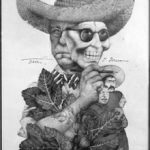Lázaro Cárdenas

“I made an effort to serve my country… with greater commitment to the needy people,” Lázaro Cárdenas wrote in his journal after he’d stepped away from the presidency and power. “I canceled many privileges and distributed much of the wealth that was in few hands.” Indeed, with a remarkable combination of compassion, cunning, and courage, he did more to fulfill the promise of the Mexican Revolución and implement the liberal tenets of the Constitución of 1917 than any other president, before or since.
After serving as a general in the Revolution and then as the liberal governor of Michoacán, Cárdenas was tapped to become the next of former President Calles’ puppets in the 1934 presidential election.
Cárdenas immediately distinguished himself as his own man, however, traveling during his presidential campaign nearly 16,000 miles throughout Mexico, eschewing the Mexico City elite and endearing himself to the rural and urban poor. He listened to them, and clearly empathized. “Nothing can more eloquently justify the long struggle of the Mexican Revolution like the existence of entire regions in which the men of Mexico live alien to all material and spiritual civilization, sunk in ignorance and absolute poverty, subjected to inferior food, clothing and accommodation that are inappropriate for a country that, like ours, has sufficient material resources to ensure a just civilization.” And he believed the federal government to be “the only institution capable of ensuring the common good of Mexicans.”
Once elected by an amazing 98% of the vote, Cárdenas turned the opulent presidential Chapultepec Palace (where Los Niños Héroes had made their supreme sacrifice) into a national museum, chose to reside instead in the far more modest Los Pinos, and cut his and all federal government salaries in half. Then, he threw his support behind labor unions, which responded by throwing their support behind him. Thus empowered, Cárdenas abruptly ordered Calles and his allies into exile, and then replaced Calles’ political party with his own, the corporatist Mexican Revolution Party (which would eventually become the current Institutional Revolutionary Party, or PRI). It was an astounding coup.
Cárdenas designed his new party with great care, giving equal representation to four major Mexican groups: the peasant union, the industrial union, the urban (government worker) union, and the military. (Noticeably lacking were the wealthy hacienda owners and the Catholic Church.) His co-opting the generals was a controversial but wiley ploy, forcing them to share their hitherto immense power with three other, now equal partners. And all were subservient to the government, i.e, Cárdenas and his party.
And then Lázaro Cárdenas rolled up his sleeves. Aggressively implementing the Constitution of 1917, he redistributed more land than all his revolutionary predecessors combined, replacing the huge haciendas with ejidos, communally owned peasant land. In fact, when he was done, one half of the county’s arable land was in the hands of previously landless farmers. He’d finally undone much of the damage that Benito Juárez’ and Porfirio Díaz’ neo-liberal “reforms” had wrought.
Although wisely choosing not to implement the radical anti-cleric tenets of the Constitution (and thus avoiding another Cristero War), Cárdenas did pry the Church’s fingers off of schools, insisting on a secular, even socialist curriculum, and investing twice as much in rural education as, once again, all his predecessors together.
But his most radical moves were yet to come. First, yet again citing the Constitution, Cárdenas nationalized the Mexican railroad system, handing management over to the unions. Next, in a breathtaking stroke when foreign—predominantly American—oil companies refused to comply with a Mexican Supreme Court ruling in favor of the workers, he nationalized the petroleum industry as well, creating what is now known as Pemex. (His and the decision’s wild popularity in Mexico protected him from what would soon become common American-sponsored coups in other Latin-American countries for far less egregious affronts to corporate, capitalist neocolonialism.)
Cárdenas had consolidated immense power in himself and his party. Nonetheless, like a modern-day Cincinatus, he relinquished it all at the end of his term, no more wealthy than when he’d begun (quite the exception, then and now). While he watched his successors and the party turn decidedly conservative, he spent the rest of his life supporting irrigation projects, free medical clinics, and education for the poor.
Today, Lázaro Cárdenas is deservedly one of Mexico’s most beloved presidents, second only to Benito Juárez. There is nary a city, town or village that doesn’t honor him with a street name.
This is a selection from Ellison’s upcoming book, Niños Héroes: The Fascinating Stories Behind Mexican Street Names.
For more information about Lake Chapala visit: www.chapala.com
- Streets of Mexico – April 2024 - March 30, 2024
- Streets of Mexico – March 2024 - February 29, 2024
- Streets of Mexico – February 2024 - January 31, 2024







